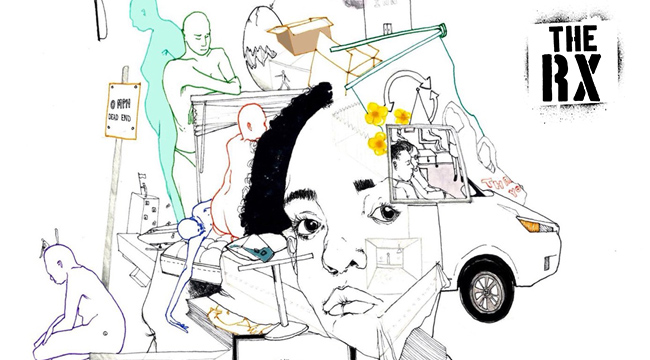
The RX is Uproxx Music’s stamp of approval for the best albums, songs, and music stories throughout the year. Inclusion in this category is the highest distinction we can bestow, and signals the most important music being released throughout the year. The RX is the music you need, right now.
It’s ironic that Noname (aka Fatimah Warner) says she makes “lullaby rap music,” because despite the gauzy, dreamlike flow state from which she pens her intricately crocheted verses and the drowsy, tranquilizing instrumentation that quilts her whisper-soft delivery, her music consists of the sort of dense, almost inscrutable storytelling and candidness that could keep the listener up all night trying to decrypt it.
“Put a thinkpiece in the rap song, the new age covenant,” she lilts on “Blaxploitation” from her latest album, Room 25, a flex that doubles as a thesis that triples as a teasing challenge. “Decipher my meaning,” she seems to tease. Multiple levels of understanding lurk beneath every mischievous turn of phrase, daring the listener to run that back, again, again, and again, until they think they might be beginning to grasp at a double meaning and wondering if they ever actually will at the same time. With her previous album, Telefone and now, with Room 25, Noname isn’t just writing lullabies, she’s dictating the future of rap, unraveling the rules of the genre to weave into an entirely new form only she could dream up.
The Chicago rapper’s style is both familiar and inviting to fans of her hometown comrades Chance The Rapper and Saba, yet enticingly unique in that it embraces the spoken-word, poetic delivery that Chance and Saba’s wordplay only hints at. Their shared origin in the poetry workshops of Chicago’s Youmedia labs network gives them common DNA, but where Noname’s male counterparts eventually aligned themselves with the common structures of relatively straightforward if heady rap, she allows herself to drift further afield. There’s more landscape on poetry’s side of the fences, and Noname freely frolics in the wider spaces afforded by the more open format, rhyming as much to melodies as she does to the lush, lively, and fully-realized beats provided by her backing band, led by longtime producer and multi-instrumentalist Phoelix, who was also largely responsible for the sonics on Telefone.
Don’t get it twisted, though, Noname can spit, and she’s unafraid to boast about it as well. On the tone-setting opener, she brags “My pussy teaching ninth-grade English / My pussy wrote a thesis on colonialism” after slinging this cocky missive: “F*cked your rapper homie, now his ass is making better music.” Of all the things women in rap have credited to their sexual abilities, none have ever resulted in improving their male counterparts’ own skill levels. It’s the type of language that was missing on Telefone; Noname admitted as much in the abbreviated promotional cycle for Room 25. “Telefone was a very PG record because I was very PG,” she told The Fader. “I just hadn’t had sex. I could’ve fabricated and made a record that was like, ‘Hell yeah I love dick,’ but I just don’t know how to do that.” However, that changed in the two years since Telefone‘s release, seemingly freeing her up to incorporate some rated R themes into Room 25‘s palette, albeit with her own unique, Noname twist.
Likewise, while her music always been confessional, almost raw in its stream-of-consciousness emotional overshare, now there’s an expanded, physical component to her introspection. She adroitly describes this newfound power and pleasure in womanhood on “Montego Bae,” confessing “I’m problematic too” while proudly indulging in the joys of her new relationship, then reminds herself of her own self-sufficiency on “With You”: “He who leeches on love is a lame, chains and left her for London / Wireless festival reparable, so good when he wasn’t.” Where Telefone dealt with the inner turmoil of growing up, Room 25 takes a look at the pages of a journal in progress, documenting the forces, people, and places Noname encounters on her journey toward self-realization.
Hip-hop is a genre of coming of age stories, yet women have largely been left out of that narrative, forced to enter the game fully-formed and declarative in their boldness. From MC Lyte and Queen Latifah to Lil Kim and Foxy Brown to Nick Minaj and Cardi B, women never got to grow up on wax until now. “Juicy,” Good Kid, Mad City, The Fresh Prince Of Bel-Air, and Boyz N Da Hood are all examples of the pivotal moments that turn boys into men, but rarely have women been allowed to express these sorts of insecurities and learning experiences in hip-hop spaces.
With Room 25, Noname captures the essence of the transition from youth to adulthood in glassy amber memories, placing herself squarely in the tradition of classic coming-of-age narratives in hip-hop — or rather, creating a new tradition, one that gives equal weight to the stories of girls growing into women. There’s another ironic layer to her “lullaby rap”: She’s giving hip-hop a wake-up call, taking the music and culture further than anyone other than she could have dreamed.
Room 25 is out now. Get it here.






